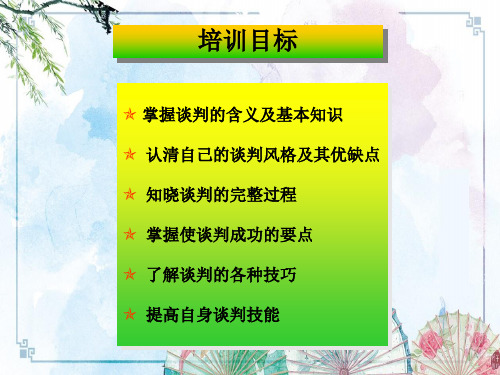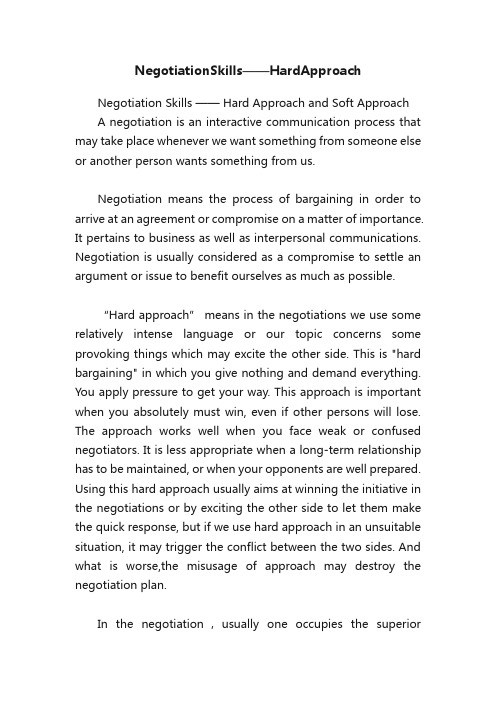Negotiation Skill
negotiation skills 谈判技巧

Negotiation Skills1. Never negotiate if it’s not necessaryBargaining is not negotiating, nor complaining. Sometimes customers just want to express their feelings to us, we shouldn’t treat them as the beginning of negotiation. Try to solve the problem, but needn’t to negotiate. New salesmen tend to negotiate everything with the customers, but neglect some of them is not necessary.2. Never negotiate with yourselfBefore negotiation, we should set up clear objectives in our minds. The target could be divided into several levels, but we shouldn’t hesitate or change them during the negotiation. If we find something wrong, then stop the negotiation or seek for a new round in future. “No deal” can mean a very good negotiation. If we need to go away from the table, just do it.3. Never accept the first offer , and4. Always ask for morePeople are used to keep some space to turn around. Both purchasers and sales will make some compromise during negotiation. The first offer usually gives a limit or anticipation for both sides to start with. For our sales, it is very important to provide the first offer higher than what we want.5. Try not to be the one with the opening positionAs salesmen, we should try to let the customers establish the opening parameters, and then we could adjust our quotation or price policy. But usually the buyers of customers also understand this point. They will try to let us to be on the position. If we have to do so, we could start with from an over comfortable position.6. Talk less and listen moreGenerally speaking, salesmen like to talk a lot to persuade the other sides accepting their ideas or proposals. They keep talking and showing off their eloquence but neglecting what the customers are thinking. When we speak, we are giving away information; when we listen, we are receiving information. To be a good listener means to interact with customers and encourage them to talk and then find out their core demands.7. Never give a gift “for free”To keep balance, if we need to give something, we should get something else. In fact, this rule is effective not only for negotiation.During our business, when I was asked by customers to provide a post-service free, of course it was beyond warranty, I would also ask them to forgive something we did imperfectly or we might do imperfectly in future. The discount today is the opening offer tomorrow.8. Avoid to fall in the “Salami effect”Price is determined by market, not cost. So when we discuss the priceduring a negotiation, we shouldn’t separate it from our cost. In other words, cost is our internal thing. Our cost is not counterpart price. Our customer will never give a higher price just because of the high cost. 9. Avoid the “Rooky feeling”As Dr. Carlos said, to do better, ask ourselves three questions:How much is this concession going to cost me?How much does it mean for the other side?What do I want in return?10. Avoid at any cost the “Quick close”As the Chinese saying goes, "good things never come easy”. Nothing good comes from the quick close. Usually people believe a relatively longer time means sufficient communication. Be patient during a negotiation.11. Never reveal your maximum offer, not even at the end ofnegotiationThe maximum offer is the last line for negotiation. Unless have no choice, we shouldn’t use it. Even we reach an agreement with the customer, we mustn’t show it. Or the counterpart could feel frustration and we lose leeway in future. We should remember that reveal the maximum offer doesn’t matter how close we are to our counterparts. 12. Understand your counterpart’s needsChinese strategist Sun Tzu said, “Know yourself and know your enemy,you will win every war.” Our counterpart is our business partner, not our enemy. But the idea of knowing our counterpart’s needs is really important. It means whether we could raise the most reasonable solutions by which the both sides could realize double win. As industry sales, we have the responsibility to provide an economical and reliable solution for our customers according to their requirements.13. Know your needsIt’s also very important to know ourselves. We should try to figure out our ideal outcome looks like and do business based on it. We defined our SWOT and create additional value for customers.14. Manage the ongoing relationshipEspecially in China, relationship is very important for the business partners. Have a good relationship could make it easy in negotiation.For us, one of the most important things in our daily work is to maintain good relationship with customers.15. Never lieTrust is the basic and important element for cooperation. One unsatisfied customer will tell 8 to 10 others about their dissatisfaction.If we lie, it is impossible to keep business for long-term. For me, if there is something inconvenient to tell my customers, I will not talk about them. But what I have told customers, they must be the truth. 16. Distinguish between “Positions” and “Interests”During negotiation, we shouldn’t only think about the benefits of ourselves based on our position. Without compromise, it’s hardly to reach an agreement. Double-win should be the common purpose for both sides.17. Winning isn’t everythingSometimes, it’s a strategy choice to retreat for advance. We are winning by losing. Sometimes, give up is the best choice.18. Walk away when you reach your objectives and you are in theleading positionSuccess could make people feel exited. The feeling about winning sometimes make us push more than what we should. Especially for sales people, when they reach the target for a deal, some of them like to keep taking a lot, but too much. It’s just like what the Chinese ancient fable described, draw a snake and add feet to it.19. Believe you are worth itKnow our SWOT, and to be confident during the negotiation. We are not wasting time; we are providing valuable products or solutions. For me, although our products are more expensive than competitors, I do believe that our products are much more reliable and cost-effective. 20. Keep the negotiation friendlyDuring the negotiation, people can get angry but the only rule is that both sides can never get angry at the same time. Sometimes, anger isjust a tactic, it’s doesn’t matter whether the emotion is true or not. The important thing is how we react. It’s necessary to manage our emotion and keep the negotiation proceeding friendly.。
Negotiation_Skills

Decision Making
推遲決定爭取時間用語 Not in the position/ Complicated
Can we defer making a decision on this right now? I need to check with my manager. Would tomorrow be OK to follow up on this?
拒絕 Can’t accept/ No Profit/ Not Possible
I'm afraid that's not possible. The competition is just too tough. I can't accept 8 dollar per set. I think that would show some difficulties since there is no profit for our side at all.
We all know it has been a tough year for us, in order to ….. Apparently, on one is pleased about the situation we are facing now, how to increase our reliability for our customers is the only……
How would you feel about 15 USD per unit? Is 12 cents acceptable to you? We're prepared to guarantee purchase of one million units for the first year. If your annual purchases fall more than 5 percent below target, would you be willing to consider a penalty?
2021年职场英语 NEGOTIATION SKILLS(谈判技巧)

职场英语 negotiation skills(谈判技巧)职场英语:negotiation skills(谈判技巧) negotiation skillsusing effective questioning 问一些有建设性的问题问一些有建设性的问题是成功协商议题的基石。
这是给了双方一个机会来表明双方各自在关键议题上的态度,例如目标及期望。
多问一些开放式的问题将可以尽早给予彼此阐述观点的机会。
例如,你可以这样问"what are you hoping to achieve today?"recovering from offending someone 克服对方敌对意识谈判中往往会遇到对方强烈的.敌对意识,这时候你必须设法克服它。
通常的方法是接受对方的“排斥”,但将之转化为正面的作用。
你可以说"if i seemed sharp a few moments ago,be assured that it was only due to mydetermination to make this work."showing humility 展现亲和力谈判是双方沟通的过程,所以必须避免陷于一连串的"i’ m right,you’ re wrong"的情形。
展现亲和力尊重那些对象,千万不要装做已有所有答案,请把一些议题的控制权让给别人你可以说"that’ s more your area of expertise than mine,so i’ d like to hear more."recovering from negotiation breakdown 让谈判“起死回生”当对方因愤怒、怨恨或不愿意聆听而使得双方关系濒临决裂的时候,要特别注意à回具有建设性的对谈。
承认错误并且展现诚意是让谈判起死回生的好办法。
【培训课件】商务谈判讲义-NEGOTIATION_SKILLS(谈判思维和心理、谈判策略与技巧、谈判

2.1.3 职能
• 实现购销 • 获取信息 • 开拓发展
2.2商务谈判的程序与模式
• 2.2.1程序 • 准备阶段:选择对象、背景调查、组建班
子、制订计划、模拟谈判 • 谈判阶段:开局、磋商、协议 • 履约阶段
2.2.2商务谈判的模式
条款顺序
商务谈判模式矩阵
慢速 中速
快速
跳跃
跳跃 跳跃
跳跃
慢速 中速
地了解别人的用意,就拥有最好的机会。
—— 美国保德信人寿保险公司 总裁 Robert Beck
知识经济时代背景的基本特点
• 知识经济时代的基本特征:知识成为 首要生产要素的时代;经济发展迅速、 观念和生活方式变革日益剧烈的时代; 人类走向终极文明的时代;创新致胜 的时代;竞争合作共赢的时代。
新时期谈判的新特点
然而,也可能经过沟通后是另外的情况,恰恰有一 个孩子即想要皮做蛋糕,又想喝橙子汁。这时,如何 能创造价值就非常重要了。
结果,想要整个橙子的孩子提议可以将其他的问题
拿出来一块谈。他说:“如果把这个橙子全给我,你 上次欠我的棒棒糖就不用还了”。其实,他的牙齿被 蛀得一塌糊涂,父母上星期就不让他吃糖了。
另一个孩子想了一想,很快就答应了。他刚刚从父
2.4 商务谈判的理论与原则
• 谈判的“需要理论” 五种需要: 生理、安全、爱与归属、尊重、自我实现三个层次: 国家间、组织间、个人间 六种适用方法: 谈判者为对方的需要出发 谈判者使对方从其自身需要着想 谈判者同时为对方和自己的需要着想 谈判者违背自己的需要 谈判者不顾对方的需要 谈判者同时损害对方和自己的需要
谈判地点
• 谈判开展的地点,谈判地点的选择是比较讲策略的。主 要有:
• 1、主座谈判 • 2、客座谈判 • 3 、主客座轮流谈判 • 4、主客场外的其他地点谈判
negotiation skills (谈判技巧)

Lose/Lose Scenario
Neither parties’ objectives are achieved Disillusioned with the process Frustration Loss of respect and trust Soured relationships No solutions generated
Willing to achieve the best deal for both parties Willing to concede to gain “Speculate to accumulate”
Skilful Negotiators
Do their research Decide what is negotiable Plan their strategy Choose the right time and place for negotiation
The Art of Negotiation
4 Main phases:
1.Do your homework (Prepare). 2.Discuss face to face 3.Propose 4.Bargain
Understanding “Needs” & “Wants”
A need is something that you must have in order to satisfy an essential requirement e.g. a suit for an important occasion; top of range tumble dryer; peak time flight/travel ticket etc. Willingness to pay more Often not negotiable A Want is usually optional, £sensitive Willing to pay/offer less but risk losing product/bargain
NEGOTIATION SKILL

[转帖]NEGOTIATION SKILL & STRATEGY谈判技巧与策略(NEGOTIATION SKILL & STRATEGY):1.谈判的定义:“谈判”,或有些人称之为“协商”或“交涉”,是担任采购工作最吸引人部分之一。
谈判通常是用在金额大的采购上,由于本公司是自选式量贩广场,采购金额很大,因此谈判工作格外地重要。
采购谈判一般都误以为是“讨价还价”,谈判在韦氏大辞典的定义是:“买卖之间商谈或讨论以达成协议”。
故成功的谈判是一种买卖之间经过计划、检讨、及分析的过程达成互相可接受的协议或折中方案。
这些协议或折中方案里包含了所有交易的条件,而非只有价格。
谈判与球赛或战争不同之点在于:在球赛或战争中只有一个赢家,另一个是输家;在成功的谈判里,双方都是赢家,只是一方可能比另一方多赢一些,这种情况是商业的常事,也就是说谈判技巧较好的一方理应获得较多的收获。
1.谈判的目标:在采购工作上,谈判通常有五项目标:(1)为相互同意的质量条件的商品取得公平而合理的价格。
(2)要使供货商按合约规定准时与准确地执行合约。
(3)在执行合约的方式取得某种程度的控制权。
(4)说服供货商给本公司最大的合作。
(5)与表现好的供货商取得互利与持续的良好关系。
2.平而合理的价格:谈判可单独与供货商进行或由数家供货商竞标的方式来进行。
单独进行时,采购人员最好先分析成本或价格。
数家竞标时,采购人员应选择两三家较低的供货商,再分别与他们谈判,求得公平而合理的价格。
3.交货期:在采购工作上交货期通常是供货商的最大问题。
大多是因为:(1)采购人员订货时间太短,供货商生产无法配合。
(2)采购人员在谈判时,未将交货期的因素好好考虑。
不切实际的交货期将危害供货商的商品质量,并增加他们的成本,间接会使供货商的价格提高。
故采购人员应随时了解供货商的生产状况,以调整订单的数量及交货期。
4.供货商的表现:表现不良的供货商往往会影响到本公司的业绩及利润,并造成客户的不满。
Negotiation Skills商务谈判

HUMOR SKILL
• HUMOROUS LANGUAGE CAN MAKE THE SERIOUS STAGE IN NEGOTIATION BECOME MORE ACCEPTABLE
TIME LIMIT
• FIXING TIME LIMIT IS NECESSARY, IT WILL DRIVE AWAY THE SLOW-MOVING, CREATE A TENSE
ATMOSPHERE, AND LEAD THE TWO SIDES TO FOCUS ON THE ISSUE.
LANGUAGE SKILLS
NEGOTIATION SKILLS
IMPLICATIONS AND EUPHEMISM
• “I AGREE WITH MOST OF WHAT YOU SAY.” • EUPHEMISM NEGATIVE APPROACH • WHAT DOES IT MEAN?
AND COMFORTABLE.
• USED TO:
• REFUTE FALLACIES • CONFIRM CONFIDENCE • CONVINCE ADVANTAGES • CREATE A GOOD ATMOSPHERE
• EXAMPLE: I AM DISAPPOINTED. THERE ARE NO ISSUES WE NEED TO DEBATE ABOUT.
Who they negotiate with What they negotiate about
Where they negotiate
OVERVIEW OF NEGOTIATION SKILLS
NegotiationSkill谈判技巧

NegotiationSkill谈判技巧何谓谈判(Negotiation)1.“施”与“受”的互动过程.2.含“合作”与“冲突”.3.是“互惠的”,但也许“不平等”.4.也许“不平等”,但一定公平.谈判的基本动作口才V.S表达能力口才并非必备条件,虽然口才好的人比较容易谈判,但是口才不好的人不代表绝对不适合谈判,例如:国家主席适合谈判吗?权力!筹码!和口吃的修理工人还价?猪吃老虎!先把发问目地讲出来中国人的逻辑:不是朋友的,都是敌人.西方人的逻辑:不是敌人的,都是朋友.在交谈中,当问任何事情,先说自己的目的,降低戒心、敌意.为什么别说“为什么”质询的口气,对方心里不舒服.可以采用请教式的语态,“我想知道……”.给对方一扇门欲擒故纵帮他找台阶.留有里子,面子给对方;拿里子,面子给上司.围师必阙.不要赶尽杀绝.为了长期的“合作”,给对方留一扇门.有底摸底,没底磨底谈判方法,东方人集中在精神层面,西方人集中在技巧层面.上谈判桌前要有谈判底线.“摸、磨”:在谈判之外的.友好气氛中获取.例如:回程机票的确认,之后可以安排游山玩水(耗费对方的时间期限底线).例如:了解到对方想谈成的欲望,之后在谈的时候可以让一些条件,在关键问题上砍价.喂反应,吐资讯点头、声音回应.——要知道别人的讯息,给回应鼓励对方吐出资讯.保持冷场.——反行其道,对方会再讲.关键字词,请对方解释.——让对方一直在讲,他“爽”,我得到信息.堆积木当接近得到结论,堆积木“列出来……那么因此……推出假设……”,试探对方的底线.感性澄清谈判易犯的错误大部分的人皆会犯所列大部分的错;少部分的人会犯所列少部分的错;而没有人不会犯错.1.争吵代替说服2.短期策略对待长期关系里子面子不能都拿,负责无法得到长期的合作关系.3.对人不对事说易行难,如何做到?尽量少用“你”“你们”,而用“我们”“咱们”;在必须说明的情况下,用“这件事”,尽可能下降矛盾.4.进入谈判却没特定目标和底线什么是真正的目标,手段不是唯一的.5.逐步退让到底线却又沾沾自喜没有目的的谈判,只会“输”!6.让步却没有要求对方回报。
Negotiation Skill2——【一汽大众】

谈判中最常见的错误:
1.带着先见进入谈判 2.不清楚谁具有最终的谈判权 3.不清楚自己的优势何在,以及如何有效地发挥这些优势 4.只带着取得谈判最终结果的总目标进入谈判. 5.不能抓住实质问题并进行深入讨论 6.不能控制表面上看起来不重要的因素 7.没有让对方先出价 8.不知道该什么时候收场
44
如何避免谈判中常见的错误:
1.不要打断对方的谈话,少说多听。 2.坦率提问,加强了解。 3.做一些诠释性的、幽默的和积极的评论。 4.利用休会来控制你的小组和讨论 5.进入谈判前,为自己制定一个明确、具体和现实的目标。 6.经常进行概述。 7.列出解释、说明和理解的要点。 8.避免使用苍白无力的语言。 9.寻找共同的基础,不要总是批评对方。 10.不要激怒对方。 11.不要对你的建议做太多的解释,以免削弱它的分量。 12.避免感情宣泄、谴责
目标
我在这场谈判中最有可能失掉什么
如何确定目标范围
? 应该在什么时候停止讨价还价?
如果我停止讨价还价还会发生什么
? 我需要对方来实现我的方案吗?
17
谈判的过程 1 - 准备
摸清对方底牌
1.主张和目标
1.曾经合作过的经验 2.资料调查
通过 3.对手的客户和竞争者
4.实际观察 5.非正式场合的接触
2.经营方式 3.业务范围
良好的职业化形象
22
谈判的过程1 - 准备
1.选择地点:主场?客场?
合理的环境设置
2.时间安排:起止时间?持续多长?
3.交通工具:按照人数事先安排
4.座次准备:方形?圆形?名片、名牌
5.所需设备:投影仪?电视?照相机 ?
6.室内温度:不宜过冷或过热
7.餐饮安排:注意有无特殊要求
NegotiationSkills——HardApproach

NegotiationSkills——HardApproachNegotiation Skills —— Hard Approach and Soft ApproachA negotiation is an interactive communication process that may take place whenever we want something from someone else or another person wants something from us.Negotiation means the process of bargaining in order to arrive at an agreement or compromise on a matter of importance. It pertains to business as well as interpersonal communications. Negotiation is usually considered as a compromise to settle an argument or issue to benefit ourselves as much as possible.“Hard approach” means in the negotiations we use some relatively intense language or our topic concerns some provoking things which may excite the other side. This is "hard bargaining" in which you give nothing and demand everything. You apply pressure to get your way. This approach is important when you absolutely must win, even if other persons will lose. The approach works well when you face weak or confused negotiators. It is less appropriate when a long-term relationship has to be maintained, or when your opponents are well prepared. Using this hard approach usually aims at winning the initiative in the negotiations or by exciting the other side to let them make the quick response, but if we use hard approach in an unsuitable situation, it may trigger the conflict between the two sides. And what is worse,the misusage of approach may destroy the negotiation plan.In the negotiation,usually one occupies the superiorposition by their absolute advantages, and get the initiative. First, the adequate professional knowledge is necessary,。
- 1、下载文档前请自行甄别文档内容的完整性,平台不提供额外的编辑、内容补充、找答案等附加服务。
- 2、"仅部分预览"的文档,不可在线预览部分如存在完整性等问题,可反馈申请退款(可完整预览的文档不适用该条件!)。
- 3、如文档侵犯您的权益,请联系客服反馈,我们会尽快为您处理(人工客服工作时间:9:00-18:30)。
让步的策略
• • • • • • • • • • 使对方先让步 当对手让步时,重申并记录下让步 仔细规划你的让步,设想其给对手的印象 高估你的让步,低估对手的让步 在非核心问题上让步,并使小让步显得象大让步 不要过早让步,它是你的筹码 每次让步都要以对手的让步为报答 掌握好让步的畴码。弄清可放弃的利益和不可放弃的利益 掌握好让步的速度。对方等待越久,让步所获会更丰富 掌握让步的代价。若不能从对手获得同等的让步,则应放弃让步
page 7 /
谈判前要问的问题
• • • • • 我有什么牌可出?对手会怎样应对呢? 对手会用什么样的策略?我该怎么办? 目前我们的关系怎样?将来的策略? 我们的底线是什么? 我们整体谈判策略怎样?如果谈不拢怎么办?
page 8 /
• 黑脸白脸:增加谈判回旋空间 • 灵活运用Benchmark:虚构“竞争者” • 索要成本构成:寻找攻击弱点 • Win-Win:构建合作关系,共同分享利益与风险 • 以潜在机会为诱饵,诱使对方让步 • 哀兵战术:唤起同情 • “震摄”战术:提出超高要求或其它使对方心理发生变化被迫重调心态 • 步步为营,直至目的地 • 持久战/拖延战术:比耐心 • 误导对手:采用暗示手法误导对手 • 设定最后期限。最后期限合理设定,会对对手构成一定心理压力 • 避难就易, 先易后难 • “坚忍不拔”策略:反复坚持,使对手最后丧失信心
Negotiation Skill workshop
By Malcolm Cheng Jul.2th, 2007
一流谈判高手具备的品质
• 换位思考 • 尊重他人与自己 • 为人正直、公正 • 坚韧不拔 • 有责任感 • 灵活的个性 • 富有幽默感 • 自律力 • /
谈判策略
• 合理公平原则 • 空城计:虚张声势,保护弱点 • 先行提出,以防对手攻击已方弱点 • 集中火力,攻其一点。放弃次要利益,争取核心利益 • 陷入僵局时引入新思路新算法 • 投其所好: 了解对手兴趣个性,投其所好 • 参与解决问题。要求对手一起参与,解除其戒心 • 劝说的艺术:把我放在对手的靴子里---设身处地 • 杀鸡给猴看 • 巧用情感、关系等因素:比如老乡、生日等 • 休息的艺术:适时提出休息,能给双方思考的时间,以便再谈 • 巧用主场优势 • 威胁的艺术
page 5 /
谈判原则
• • • • • • • • • 少说多听 耐心是胜利女神 落笔才作数 多作形势判断,以调整你的谈判策略 知己知彼,百战百胜 作不到,别承诺 成功的谈判建立在充分的准备上 Win-win永远是主旋律 对事不对人
page 6 /
销售常用策略: 你怎么办?
• • • • • • • • • • • • 白脸/黑脸,流程,内部规定,…… 装聋作哑,回避战术,拖延战术 强调更优顾客以降低你的重要性 成本已大于售价 攻击你的弱点: bad payment, low volume/high mix, over specified, 哀兵战术:诉苦,不赚钱,…… 拉关系,打情感牌,美人计 卖弄专业知识 Win-win战术 转移视线:强调质量风险,交货风险,…… 空头支票: 拒绝谈判:take it or leave it!
